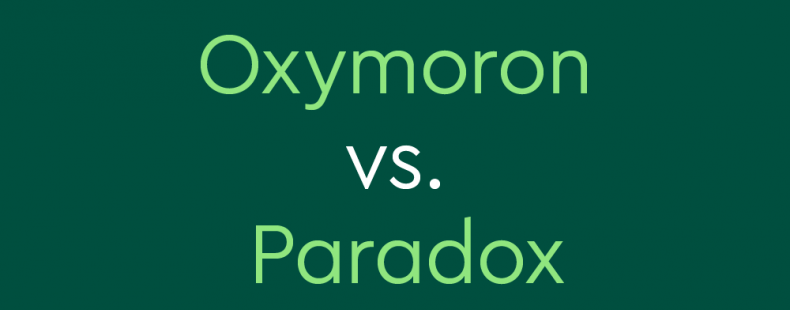When parents become empty nesters after their kids head off to college, they may be surprised by the deafening silence of their home. The emptiness can be bittersweet as mom and dad find themselves alone together.
In the above sentences, these parents are dealing with quite a few contradictions. Are these examples of oxymorons or paradoxes? Or, is an oxymoron a synonym for a paradox? Let’s take a look.
What is a paradox?
Paradox is a noun with several nuanced definitions that address the way we use contradictions to make a point when we speak. Paradox is also a rhetorical device that can mean a statement that is self-contradictory.
As a rhetorical device, paradox is “a statement or proposition that seems self-contradictory or absurd but in reality expresses a possible truth.” Rhetorical devices—which include our old friends metaphor and hyperbole—are used to make a point when you’re speaking. For example: she is worried because the more she sleeps, the more tired she feels in the morning instead of waking up well rested. Or, while wedding dress shopping, the mother of the bride kept reminding her daughter that less is more and encouraged her to pick a sleek gown that was actually more impactful. The idea that less is more seems contradictory, but the statement contains a truth.
Paradox also has a more common, everyday use. A paradox can mean that something or someone is self-contradictory. For example: skeptics believe that the idea of a truthful politician, who works only with the best interest of his or his constituents at heart, is a paradox and aren’t confident any are capable of uninfluenced honesty.
Or: many reality TV shows are a paradox because they claim to portray “real” lives despite the behind-the-scenes production and manipulation.
Lastly, paradox can also refer to something that’s contrary to commonly accepted opinion. This meaning is considered obsolete, however.
Paradox‘s first known use was in 1530–40, and it originates from the Latin word paradoxum via Greek parádoxos (meaning “unbelievable, literally, beyond belief”). Synonyms for paradox include puzzle, anomaly, and riddle.
What is an oxymoron?
An oxymoron is also a noun that’s defined as “a figure of speech by which a locution produces an incongruous, seemingly self-contradictory effect, as in ‘cruel kindness’ or ‘to make haste slowly.'” So when contradictory or opposing words are combined, that expression is an oxymoron. Additional examples of this rhetorical device include living death, bittersweet, and poor little rich girl.
Oxymoron was first recorded in 1650–60 and originates from the Latin word oxymorum via the presumed Greek oxýmōron.
How to use each word
Although both a paradox and an oxymoron involve contradictions, they have an important difference. A paradox is a rhetorical device or a self-contradictory statement that can actually be true. While an oxymoron is a figure of speech that pairs two opposing words.
The key to easily spotting the difference is to focus on the meanings of the words themselves. In an oxymoron, the words themselves have a shade of contradiction in their definitions.
For example: Billy hushed the other students and told them to act naturally before the teacher walked in. In this case, act naturally is an oxymoron that combines two contradictory words.
But if Billy decided to deliver some harsh truth to a fellow classmate in order to help her, he’s going by the paradox that sometimes you have to be cruel in order to be kind. This sentiment is a paradox and not an oxymoron because it is a statement that seems contradictory at first (being mean in order to be kind), but there’s actually some truth to it.
Other examples of oxymorons:
- During the coronavirus pandemic, many feel alone together as everyone engages in social-distancing and takes comfort in this oxymoron.
- Mary must be clearly confused because when I asked if she wanted to go out tonight, her answer was, “definitely maybe.”
Other examples of paradoxes:
- The greatest thing that can come from hate is love, and William Shakespeare proved this paradox in Romeo and Juliet.
- My mother taught me that the enemy of my enemy is my friend, and this paradox has been useful while dealing with both high school and workplace politics.
We have even more articles to clear up confusing conundrums for you, including the difference between figuratively and literally, and wisdom vs. knowledge. The more you know, the more you realize you don’t, right?














